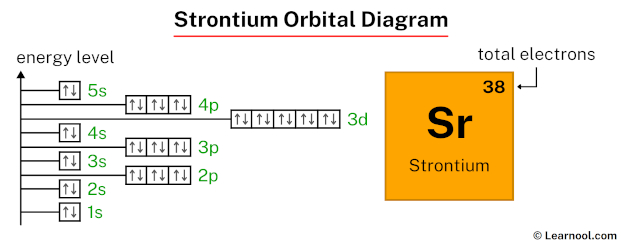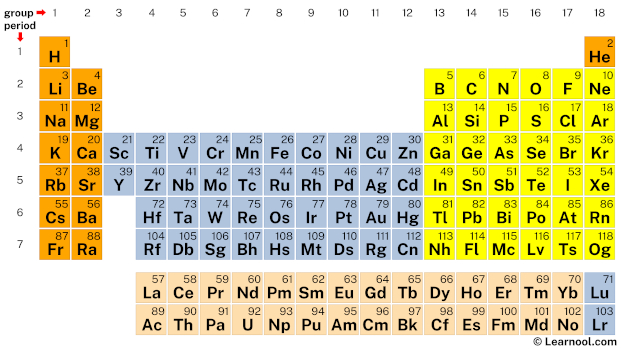
In the strontium orbital diagram, the 1s subshell accommodates two electrons, the 2s subshell holds another pair, the 2p subshell has a maximum of six electrons, the 3s subshell contains two electrons, the 3p subshell has a maximum of six electrons, the 4s subshell accommodates two electrons, the 3d subshell holds ten electrons, the 4p subshell has a maximum of six electrons, and the 5s subshell contains two electrons, totaling thirty-eight electrons.
To illustrate the strontium orbital diagram, determine the number of electrons from the periodic table. Note the electron configuration for reference and adhere to the three essential rules: the Aufbau principle, Pauli exclusion principle, and Hund’s rule. This systematic approach ensures a precise representation of strontium’s orbital arrangement.
Steps
Find electrons

The atomic number of strontium represents the total number of electrons of strontium. Since the atomic number of strontium is 38, the total electrons of strontium are 38.
Write electron configuration
The electron configuration of strontium is 1s2 2s2 2p6 3s2 3p6 4s2 3d10 4p6 5s2.
Learn how to find: Strontium electron configuration
Now in the next step, start drawing the orbital diagram for strontium.
Draw orbital diagram
Before drawing the orbital diagram, you should know the three general rules.
- Aufbau principle – electrons are first filled in lowest energy orbital and then in higher energy orbital
- Pauli exclusion principle – two electrons with the same spin can not occupy the same orbital
- Hund’s rule – each orbital should be first filled with one electron before being paired with a second electron
Also, you should know the number of orbitals in each subshell.
We can calculate the number of orbitals in each subshell using the formula: 2ℓ + 1
Where, ℓ = azimuthal quantum number of the subshell
For s subshell, ℓ = 0
For p subshell, ℓ = 1
For d subshell, ℓ = 2
For f subshell, ℓ = 3
So each s subshell has one orbital, each p subshell has three orbitals, each d subshell has five orbitals, and each f subshell has seven orbitals.
Now start to draw!
As mentioned above, the electron configuration of strontium is 1s2 2s2 2p6 3s2 3p6 4s2 3d10 4p6 5s2. Hence, draw the blank orbital diagram of strontium up to 5s subshell as follows:

In the above orbital diagram, the box represents an orbital. Each orbital has a capacity of two electrons. And the arrows (↑↓) are drawn inside the box to represent electrons.
Now 1s2 indicates that the 1s subshell has 2 electrons. So draw two arrows in the 1s box showing two electrons as follows:

2s2 indicates that the 2s subshell has 2 electrons. So draw two arrows in the 2s box showing two electrons as follows:

2p6 indicates that the 2p subshell has 6 electrons. So draw six arrows in the 2p box showing six electrons as follows:

3s2 indicates that the 3s subshell has 2 electrons. So draw two arrows in the 3s box showing two electrons as follows:

3p6 indicates that the 3p subshell has 6 electrons. So draw six arrows in the 3p box showing six electrons as follows:

4s2 indicates that the 4s subshell has 2 electrons. So draw two arrows in the 4s box showing two electrons as follows:

3d10 indicates that the 3d subshell has 10 electrons. So draw ten arrows in the 3d box showing ten electrons as follows:

4p6 indicates that the 4p subshell has 6 electrons. So draw six arrows in the 4p box showing six electrons as follows:

5s2 indicates that the 5s subshell has 2 electrons. So draw two arrows in the 5s box showing two electrons as follows:

That’s it! This is the final orbital diagram of strontium as we have used all 38 electrons.
Next: Barium orbital diagram
Related
More topics
- Strontium
- Strontium Bohr model
- Strontium electron configuration
- Strontium protons neutrons electrons
- Strontium valence electrons
Deep
Learnool.com was founded by Deep Rana, who is a mechanical engineer by profession and a blogger by passion. He has a good conceptual knowledge on different educational topics and he provides the same on this website. He loves to learn something new everyday and believes that the best utilization of free time is developing a new skill.
